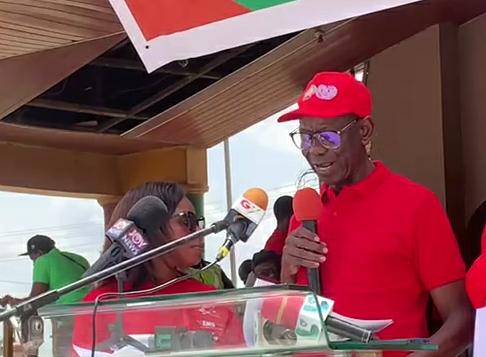A senior official of the Trade Union Congress (TUC) has delivered a sharp critique of Ghana’s public sector pay system, calling for a complete overhaul to address what he described as glaring inequalities and widespread worker hardship.
Speaking at this year’s May Day celebrations at the Jubilee Park in Kumasi, Augustine Adongo, the Ashanti Regional Secretary of the TUC, said Ghanaian workers are struggling to survive under an outdated and unfair wage framework.
“There is a huge and unacceptable gap in pay and benefits between the political class under Article 71 and the rest of public sector workers on the Single Spine Salary Structure,” he told a large crowd of workers and dignitaries.
Adongo said the disparity extends even further between civil servants and executives of state-owned enterprises, many of whom receive significantly higher allowances despite being paid from the same public purse.
“It is a scandal that some Chief Executive Officers of state entities have rent allowances that are three times more than the salary of the highest-paid public servant on the Single Spine,” he said.
He warned that the current system is “energy-sapping and demotivating” for workers who are unable to meet the basic needs of their families.
“The pay structure in Ghana today does not reflect the cost of living or the economic realities facing workers,” he noted. “We demand a total reset of the pay regime.”
Mr Adongo called for the introduction of a transparent wage-setting mechanism grounded in economic indicators and fairness, proposing the replacement of Ghana’s national minimum wage with what he described as a “living wage.”
He explained that a living wage would take into account not just the survival needs of workers and their families, but also the productivity concerns of employers.
The TUC has long advocated for reforms to the country’s salary system, but the call has gained renewed urgency as inflation and economic pressures continue to weigh heavily on ordinary Ghanaians.
This year’s May Day theme, “Resetting Pay and Working Conditions in Ghana: The Role of Stakeholders,” reflects growing calls for reform across several sectors of the economy.
The Kumasi Metropolitan Chief Executive, Richard Ofori Agyemang Boadi, commended Ghanaian workers for their resilience and continued dedication despite the economic hardships facing the country.
Boadi, who represented the Ashanti Regional Minister Dr Frank Amoakohene acknowledged the frustrations many employees experience, particularly with low wages and tough living conditions. He, however, assured workers that the government remained committed to improving their livelihoods through policy reforms and job creation efforts.
“Our workers are the backbone of our economic transformation,” Mr Boadi said. “This May Day, as we celebrate your sacrifices, we renew our pledge to create an environment where hard work is rewarded, and workers’ rights are protected.”
He also urged workers to invest in upgrading their skills to remain competitive in an evolving job market, adding that sustainable progress required a partnership between government and the private sector.
“I encourage all private sector employers to work with government in championing better working standards,” he said.
The May Day parade featured vibrant displays from major labour unions including the Ghana National Association of Teachers (GNAT), the Health Services Workers’ Union, and the Industrial and Commercial Workers’ Union (ICU).
Workers marched through the streets of Kumasi in colourful uniforms, hoisting placards with messages calling for improved wages, safer workplaces, and respect for labour rights.
Special awards were presented to outstanding workers and unions who demonstrated exceptional commitment to excellence and service over the past year.
